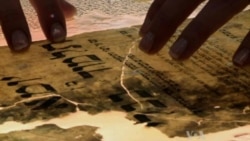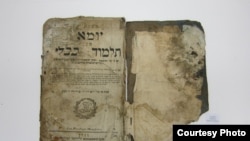WASHINGTON —
Maurice Shohet shuffles through a box full of old black-and-white photos and reminisces about growing up in Baghdad, in one of the world’s oldest Jewish communities.
The snapshots show family weddings and bar-mitzvahs, and there’s one of him and his brothers in t-shirts, and his mother in a bulky old rowboat on the serene waters of the Tigris River.
The Shohet family fled Iraq in 1970 - crossing the border on foot in the dead of night - during the reign of Saddam Hussein’s Arab nationalist Baath Party. But Shohet is still proud of his fatherland.
“I love Iraq because I was born and raised there. And the people are wonderful,” he said, wistfully. “We cannot equate what happened at the time by the Baath regime as reflecting everybody.”
Shohet loaned his family album to accompany a National Archives exhibit of a trove of Jewish religious books and community documents found in Baghdad during the Iraq war.
U.S. soldiers searching for weapons of mass destruction discovered them in the flooded basement of the Mukhabarat, Saddam Hussein’s intelligence service.
The exhibit, “Discovery and Recovery: Preserving Iraqi Jewish Heritage,” opens next week at the Museum of Jewish Heritage in New York, after being on display since November at the National Archives in Washington. It will run in New York until May 18.
Iraq’s Jews once numbered about 150,000 and the archive offers a glimpse at the life of one of the most important Jewish communities of the Middle East, which dates back thousands of years, but was driven out in the 20th century amid Arab nationalism and the founding of Israel.
In total, more than 2,700 books and documents were recovered from the Mukhabarat headquarters, including dozens of Torah fragments, a “tik,” or Torah scroll case, and scriptural books dating back to the 16th century. Many were printed in Baghdad, but some were brought from faraway places such as Venice.
They were in such bad shape - soggy and stuck together, and covered with mold - that they had to be frozen immediately despite the war situation, said Doris Hamburg, who directed the preservation effort.
“They were able, believe it or not, to find a freezer truck in these very difficult circumstances in Baghdad,” she said.
According to the U.S.-Iraqi agreement to bring the items to the United States for restoration, they are scheduled to be shipped back to Iraq after the process is completed this year. The U.S. State Department says it has trained Iraqi archivists to make sure the collection is protected in Baghdad.
Iraqi Jews living in the U.S., though, backed by major Jewish organizations, say the U.S. government had no right to promise to return the archive.
Iraq's ambassador offered in an interview with the Jewish Daily Forward to delay the return of the artifacts.
For Maurice Shohet, that is not enough. He argued that Iraqi-Jewish expatriates were never consulted about the agreement, and maintains the items still belong to them.
“Because they were confiscated from us to begin with,” he said. “So it has to be returned to the community, since there is no community left in Iraq, only five people who are afraid even to meet each other.”
The snapshots show family weddings and bar-mitzvahs, and there’s one of him and his brothers in t-shirts, and his mother in a bulky old rowboat on the serene waters of the Tigris River.
The Shohet family fled Iraq in 1970 - crossing the border on foot in the dead of night - during the reign of Saddam Hussein’s Arab nationalist Baath Party. But Shohet is still proud of his fatherland.
“I love Iraq because I was born and raised there. And the people are wonderful,” he said, wistfully. “We cannot equate what happened at the time by the Baath regime as reflecting everybody.”
Shohet loaned his family album to accompany a National Archives exhibit of a trove of Jewish religious books and community documents found in Baghdad during the Iraq war.
U.S. soldiers searching for weapons of mass destruction discovered them in the flooded basement of the Mukhabarat, Saddam Hussein’s intelligence service.
The exhibit, “Discovery and Recovery: Preserving Iraqi Jewish Heritage,” opens next week at the Museum of Jewish Heritage in New York, after being on display since November at the National Archives in Washington. It will run in New York until May 18.
Iraq’s Jews once numbered about 150,000 and the archive offers a glimpse at the life of one of the most important Jewish communities of the Middle East, which dates back thousands of years, but was driven out in the 20th century amid Arab nationalism and the founding of Israel.
In total, more than 2,700 books and documents were recovered from the Mukhabarat headquarters, including dozens of Torah fragments, a “tik,” or Torah scroll case, and scriptural books dating back to the 16th century. Many were printed in Baghdad, but some were brought from faraway places such as Venice.
They were in such bad shape - soggy and stuck together, and covered with mold - that they had to be frozen immediately despite the war situation, said Doris Hamburg, who directed the preservation effort.
“They were able, believe it or not, to find a freezer truck in these very difficult circumstances in Baghdad,” she said.
According to the U.S.-Iraqi agreement to bring the items to the United States for restoration, they are scheduled to be shipped back to Iraq after the process is completed this year. The U.S. State Department says it has trained Iraqi archivists to make sure the collection is protected in Baghdad.
Iraqi Jews living in the U.S., though, backed by major Jewish organizations, say the U.S. government had no right to promise to return the archive.
Iraq's ambassador offered in an interview with the Jewish Daily Forward to delay the return of the artifacts.
For Maurice Shohet, that is not enough. He argued that Iraqi-Jewish expatriates were never consulted about the agreement, and maintains the items still belong to them.
“Because they were confiscated from us to begin with,” he said. “So it has to be returned to the community, since there is no community left in Iraq, only five people who are afraid even to meet each other.”






